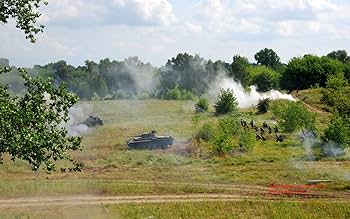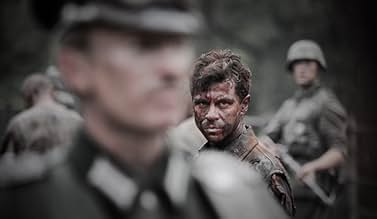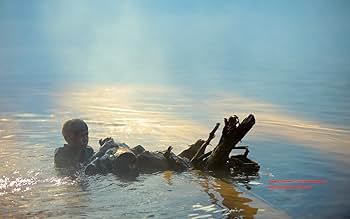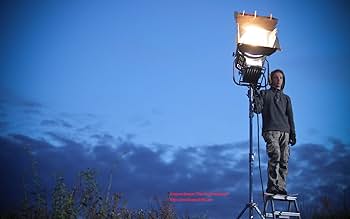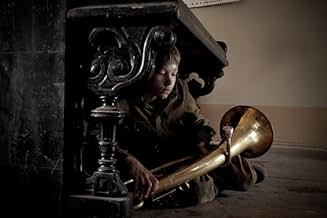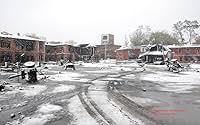VALUTAZIONE IMDb
7,4/10
10.919
LA TUA VALUTAZIONE
Aggiungi una trama nella tua linguaA war drama set during the Nazi invasion of the Soviet Union in June 1941, in which Soviet troops held on to a border stronghold for nine days.A war drama set during the Nazi invasion of the Soviet Union in June 1941, in which Soviet troops held on to a border stronghold for nine days.A war drama set during the Nazi invasion of the Soviet Union in June 1941, in which Soviet troops held on to a border stronghold for nine days.
- Regia
- Sceneggiatura
- Star
- Premi
- 7 vittorie e 14 candidature totali
Aleksey Kopashov
- Sashka Akimov
- (as Alyosha Kopashov)
Anna Tsukanova-Kott
- Sonya
- (as Anna Tsukanova)
Recensioni in evidenza
War movies based on true events are always something special because you can feel the suffering and the absurdity of war. Most of World War II movies are about well known battles like Normandy, Obama Beach, The Ardennes and so on, but I prefer watching more unknown battles because they have the right to be remembered also. In this movie we get another untold story about the Soviet troops defending the Brest fortress against the German Nazi invasion. We will never know how accurate those battles are. It's a Soviet movie so it might been shot as Soviet propaganda. But the least we can say is that this movie is very well done. Not the usual goodlooking Hollywood stars playing a war hero, but actual day-to-day normal looking people, like you and me, acting in some very captivating scenes. I don't know if those actors are famous in their fatherland but they sure did a hell of a good job. Probably not with a huge budget, they still managed to make it look pretty real. The story about this East front battle is special, sometimes told with a narrating voice of a kid that survived this hell, and will certainly have your attention. After Anthropoid and Kajaki, another great war movie that won't leave you without emotion.
A convincing and brutal drama about the war's ugly and scary face, which is as much poignant as it is riveting and engrossing from start to finish.
The doomed fortress of the border town of Brest was built a hundred years before the first onset of German deceitful invasion into the Soviet land at early dawn of June 22, 1941. It had been changing hands several times before, notably in 1918 when it was surrendered to the Germans under notorious Brest Peace Treaty. It was released thereafter to the Poles, then liberated by the Red Army, then transferred to Poland again. Under the Polish administration the fortress was first affected by German air raid in 1939 and significantly damaged under the massive onslaught of the German troops.
Before the end of 1939 the city of Brest (and its fortress) was finally incorporated into the Soviet Union. By the commencement of war, the Brest fortress was a home to a number of Soviet military units - infantry battalions, reconnaissance and artillery regiments, miscellaneous attached units and troops, all-in-all up to 8000 servicemen and several hundreds of their families, wives and children were stationed therein.
The film starts unfolding peacefully on the eve of the war - a regular day in the lives of ordinary people in a military compound - orchestra rehearsals, dancing, shopping, kisses, Saturday evening film screening - the late peaceful everyday routine...
Persistent rumors that the Germans were cranking up preparations for a breakthrough on the border were considered as sabotage and eventually suppressed. But anticipation of imminent disaster was intensified by a particularly creepy late night scene of the special vanguard troops disguised in Soviet military uniform disembarking from a train following subdued German language orders.
Heavy artillery fire that all of a sudden pierced silence at the daybreak of June 22 instantly inflicted heavy human and material losses, disrupted communication, cut off power supply and destroyed military munitions. Followed by meticulously coordinated combat assault immediately afterward, it took the inhabitants by surprise and split the garrison into several relatively small and isolated pockets of nevertheless pretty fierce resistance.
Under massive German attacks the city was defeated fairly early, whereas the small number of the besieged Brest fortress survivors with scarce resources, deprived of food, water and medicine, and with narrowing hope for reinforcement or backing from the retreating regular forces, kept on defending the small plot of Soviet land against the invaders for many days.
Though the essence of the story is certainly a portrayal of the valor of Soviet soldiers that lost their lives defending the first citadel and symbol of Russian resistance, the film manages to avoid as much as possible worn-out heroic clichés and propagandistic pathos that were often compulsory elements even in the best examples of Soviet war movies of the past. Yet, unlike many politically engaged modern movies, it resists the temptation to deride the peculiarities of Soviet lifestyle of that time and to speculate on the popular issues of "Stalinist regime's atrocities".
Instead, the film focuses on accurate capturing of a full range of authentic human emotions from joy, love and devotion at the early beginning of the film through angst, fear and pain as it progresses to hopelessness and despair. It tells the frightening story of regular people, which lives were turned upside down overnight when they end up face to face with unstoppable deadly force menacing their families, their loved ones, their own lives and their country.
It pulls no punches when it comes to depiction of enormous destructions and horrors of war with first rate set designs and visually arresting special effects, but the main asset of the film is, of course, excellent nuanced performances from the entire cast especially the leads - Korshunov, Merzlikin and Derevyanko.
The story is told as if from the perspective of a teenage boy witnessing the outbreak of war and providing narration already as a war veteran that has survived the worst war in modern history. It may be emotionally draining cinematic experience for many viewers, but I believe it could be especially conducive for the younger generation to acquire better understanding of the actual tremendous price the nation has paid for the great Victory.
The doomed fortress of the border town of Brest was built a hundred years before the first onset of German deceitful invasion into the Soviet land at early dawn of June 22, 1941. It had been changing hands several times before, notably in 1918 when it was surrendered to the Germans under notorious Brest Peace Treaty. It was released thereafter to the Poles, then liberated by the Red Army, then transferred to Poland again. Under the Polish administration the fortress was first affected by German air raid in 1939 and significantly damaged under the massive onslaught of the German troops.
Before the end of 1939 the city of Brest (and its fortress) was finally incorporated into the Soviet Union. By the commencement of war, the Brest fortress was a home to a number of Soviet military units - infantry battalions, reconnaissance and artillery regiments, miscellaneous attached units and troops, all-in-all up to 8000 servicemen and several hundreds of their families, wives and children were stationed therein.
The film starts unfolding peacefully on the eve of the war - a regular day in the lives of ordinary people in a military compound - orchestra rehearsals, dancing, shopping, kisses, Saturday evening film screening - the late peaceful everyday routine...
Persistent rumors that the Germans were cranking up preparations for a breakthrough on the border were considered as sabotage and eventually suppressed. But anticipation of imminent disaster was intensified by a particularly creepy late night scene of the special vanguard troops disguised in Soviet military uniform disembarking from a train following subdued German language orders.
Heavy artillery fire that all of a sudden pierced silence at the daybreak of June 22 instantly inflicted heavy human and material losses, disrupted communication, cut off power supply and destroyed military munitions. Followed by meticulously coordinated combat assault immediately afterward, it took the inhabitants by surprise and split the garrison into several relatively small and isolated pockets of nevertheless pretty fierce resistance.
Under massive German attacks the city was defeated fairly early, whereas the small number of the besieged Brest fortress survivors with scarce resources, deprived of food, water and medicine, and with narrowing hope for reinforcement or backing from the retreating regular forces, kept on defending the small plot of Soviet land against the invaders for many days.
Though the essence of the story is certainly a portrayal of the valor of Soviet soldiers that lost their lives defending the first citadel and symbol of Russian resistance, the film manages to avoid as much as possible worn-out heroic clichés and propagandistic pathos that were often compulsory elements even in the best examples of Soviet war movies of the past. Yet, unlike many politically engaged modern movies, it resists the temptation to deride the peculiarities of Soviet lifestyle of that time and to speculate on the popular issues of "Stalinist regime's atrocities".
Instead, the film focuses on accurate capturing of a full range of authentic human emotions from joy, love and devotion at the early beginning of the film through angst, fear and pain as it progresses to hopelessness and despair. It tells the frightening story of regular people, which lives were turned upside down overnight when they end up face to face with unstoppable deadly force menacing their families, their loved ones, their own lives and their country.
It pulls no punches when it comes to depiction of enormous destructions and horrors of war with first rate set designs and visually arresting special effects, but the main asset of the film is, of course, excellent nuanced performances from the entire cast especially the leads - Korshunov, Merzlikin and Derevyanko.
The story is told as if from the perspective of a teenage boy witnessing the outbreak of war and providing narration already as a war veteran that has survived the worst war in modern history. It may be emotionally draining cinematic experience for many viewers, but I believe it could be especially conducive for the younger generation to acquire better understanding of the actual tremendous price the nation has paid for the great Victory.
10nh3nh4
In case you've come upon this movie by accident, I'd suggest you go ahead and watch it, and then return return back to read the reviews.
The Brest Fortress pushes war movies to a completely different level of realism, poetry and emotional force. It is so visceral, so real and so emotionally powerful that by the end you're part of the battle and no longer a detached viewer. Not a single shot is wasted, not a single line of dialog is a filler, not a single acting even from extras feels like acting, not a single moment do you feel that this is a movie and not real life. The makeup, the wounds, the dirt, the blood, everything is real and it all hits you with one of the best cinematography in a war movie since Ivan's Childhood. And The Brest Fortress pays homage to that great movie in many ways.
Russians suffered unimaginable horrors during WWII and that trauma in their psyche along with their great heritage of story telling and great cinema combines to create another great Russian war movie.
I feel privileged to have watched this movie, knowing that its still unknown in the west, there is not even a wikki page about it yet.
The Brest Fortress pushes war movies to a completely different level of realism, poetry and emotional force. It is so visceral, so real and so emotionally powerful that by the end you're part of the battle and no longer a detached viewer. Not a single shot is wasted, not a single line of dialog is a filler, not a single acting even from extras feels like acting, not a single moment do you feel that this is a movie and not real life. The makeup, the wounds, the dirt, the blood, everything is real and it all hits you with one of the best cinematography in a war movie since Ivan's Childhood. And The Brest Fortress pays homage to that great movie in many ways.
Russians suffered unimaginable horrors during WWII and that trauma in their psyche along with their great heritage of story telling and great cinema combines to create another great Russian war movie.
I feel privileged to have watched this movie, knowing that its still unknown in the west, there is not even a wikki page about it yet.
I don't like reading subtitles, but I will for a particularly good movie, and this certainly is one. I also don't normally gravitate toward war movies, but again, I'll make an exception for a good one, and I give this one a 9. It might be even better than that. There is so much for the eye here; I'm very impressed at the amount of work which must have gone into making every shot look so real. Also, the soundtrack was not overwhelming; for the most part, what we see is what carries the emotion, and that is a testament to the power of the events and the quality of the reconstruction of them for this movie.
There's a lot of violence, shooting, dying, etc. here, but not a lot of really nasty gore, which is something I appreciate. I'm sure the reality may have been even uglier than what is shown in this movie, but I don't need to see every last ounce of gore to know that war sucks and people get horribly maimed and killed. What is shown is enough to make the point well.
Very high quality movie; strongly recommended.
There's a lot of violence, shooting, dying, etc. here, but not a lot of really nasty gore, which is something I appreciate. I'm sure the reality may have been even uglier than what is shown in this movie, but I don't need to see every last ounce of gore to know that war sucks and people get horribly maimed and killed. What is shown is enough to make the point well.
Very high quality movie; strongly recommended.
10chip1977
I like this movie considering all the crap films made in my country for last 20 years. From my view it has almost no propaganda (ok, I'm brainwashed already). Narrator probably is telling less that he could, so some plot points are not that clear, but the film keeps you at the screen for all the time.
And final note to some historians here: if you mention history background and occupation of Brest by Soviet Union in 1939, please go further and mention that it was taken by Poland from Russia in 1919, it was behind the Curzon line (the Poland people were not the majority of population) and should have stayed the Russian city.
And final note to some historians here: if you mention history background and occupation of Brest by Soviet Union in 1939, please go further and mention that it was taken by Poland from Russia in 1919, it was behind the Curzon line (the Poland people were not the majority of population) and should have stayed the Russian city.
Lo sapevi?
- BlooperAround time code 1h20, we see Stukas bombing the fortress. The firsts Stukas pass arrive correctly. The other Stukas have their head down and arrive on the back. Technicians have probably inverted the images.
- ConnessioniFeatures Tutto il mondo ride (1934)
I più visti
Accedi per valutare e creare un elenco di titoli salvati per ottenere consigli personalizzati
- How long is Fortress of War?Powered by Alexa
Dettagli
- Data di uscita
- Paesi di origine
- Sito ufficiale
- Lingue
- Celebre anche come
- Fortress of War
- Luoghi delle riprese
- Aziende produttrici
- Vedi altri crediti dell’azienda su IMDbPro
Botteghino
- Lordo in tutto il mondo
- 4.569.604 USD
- Tempo di esecuzione2 ore 18 minuti
- Colore
- Mix di suoni
- Proporzioni
- 2.35 : 1
Contribuisci a questa pagina
Suggerisci una modifica o aggiungi i contenuti mancanti



